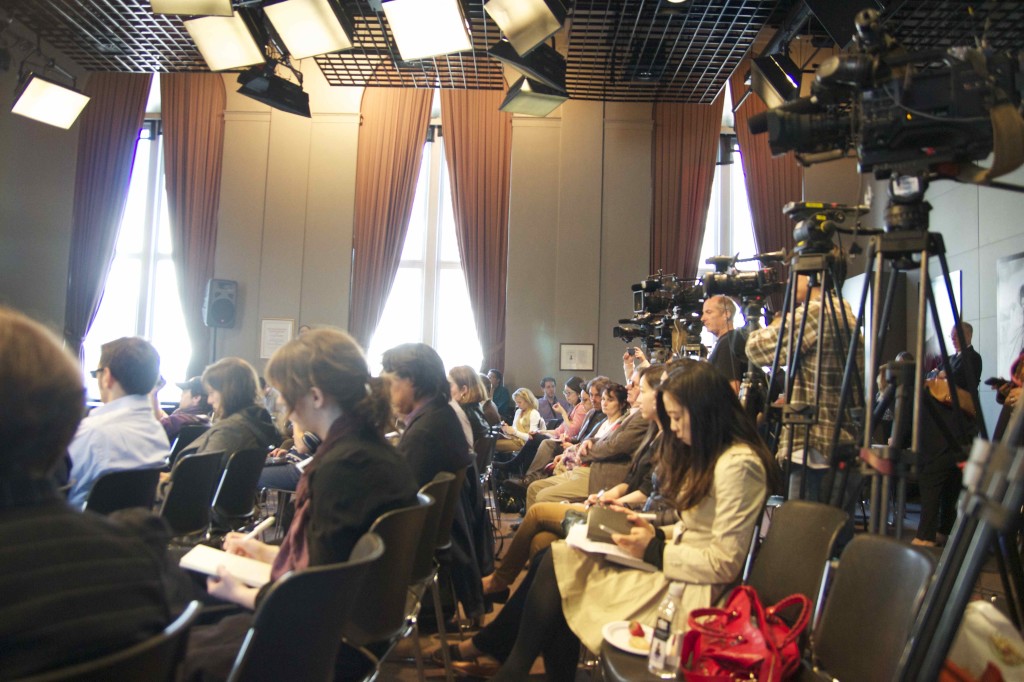
http://twitter.com/rolldiggity/status/323888998558867456
On the third floor of the Columbia University Graduate School of Journalism is the Pulitzer World Room, a mid-sized chamber that could easily double as a church sanctuary. Today, at around 2:30 PM, I arrived there to cover the official announcement of the Pulitzer Prize winners that was scheduled to take place at 3 PM.
After setting up with my computer, camera, and obligatory coffee, I began scanning TweetDeck, trying to find which hashtag was associated with the event and generally catching up on news. At around 2:51 PM, I ran across this tweet:
Two huge explosions just went off at #bostonmarathon finish. Cops running.
— Will Ritter (@MrWillRitter) April 15, 2013
At the time, it seemed out of place in my newsfeed, but it quickly became apparent just how relevant it was. Within minutes, a torrent of reports began flooding my computer screen in 140-character increments.
As it turns out, few places are more depressing than Twitter in the aftermath of a tragedy. What remains for most sentient human beings an unalloyed catastrophe that is mourned in solidarity with its victims requires all of thirty seconds on Twitter to devolve into a circus of self-righteous finger-wagging.
Of which I, like so many others, played my part. And yet there were so many aspects of today’s perfect Twitter storm that were so enraging in their lack of imagination and their utter predictability that it all felt, somehow, as if it were too much to handle at once.
I am from Boston (Everett, more precisely), and — like all Bostonians — have walked down Boylston Street far too many times to remember. Patriots’ Day is really, in the end, about two things: morning baseball and the Boston Marathon. Drinking plays a large role in both, and that is that.
And so part of my disbelief at the initial reports stemmed directly from the fact that a bombing in my hometown seemed so surreal, so otherworldly, so impossible, that it couldn’t have actually happened. I tried getting through to my parents and my little sister and kept bumping up against voicemail messages, endlessly ringing phones, and the even more ominous technical messages informing me the call could not be connected “at this time.” Eventually, I discovered none of them had even been in Massachusetts that day, let alone at home in Boston. But the horror remained.
There is a natural coming together after a tragedy. But even within this organic human impulse are concentric circles, ever-widening (or ever-narrowing, depending on the perspective) to include various scopes of “there”-ness. On September 11th, all Americans felt like New Yorkers. And all New Yorkers felt as if they had been at Ground Zero.
In reality, some people actually were there. Then, these geographical distinctions seemed not to matter. But today, there appeared to be a self-sorting taking place: the Bostonians versus the non-Bostonians, the true mourners versus the politicizers, those who demonstrated online “tact” versus the opportunists, and so on.
And yet we were all opportunists. If nothing else, today reminded me of how enormously petty people can be, as an actual human calamity was subsumed online under a wave of concern trolling and one-upsmanship. I don’t mean to pick on any one person in particular — because there truly was an enormous number of people doing this today — but it just so happened that one particular tweeter was especially prolific in this regard:
http://twitter.com/SaraMorrison/status/323880863672709120
http://twitter.com/SaraMorrison/status/323881303307075584
http://twitter.com/SaraMorrison/status/323888982779916288
http://twitter.com/SaraMorrison/status/323924796918358017
http://twitter.com/SaraMorrison/status/323950201163354112
Again, my point is not to pick on Morrison, with whom I’ve briefly interacted on Twitter in the past without incident (is there such a thing as a Twitter incident? a Twitcident?). She’s just the one particular user handle I remember from a long day of staring at my computer screen. I normally find her quite interesting, which is why I follow her in the first place.
But tweets like the above, in which boundaries are quickly drawn and stakes are claimed to some online/virtual form of legitimacy or sensitivity are just…ridiculous. Similarly maddening (and yet entirely predictable) is the knee-jerk scouring for the nearest maniac to provide a useful unhinged quote:
http://twitter.com/zackbeauchamp/status/323904005384323074
Controversial group Westboro Baptist Church says it will picket funerals of those killed by Boston Marathon bombs.
— Matthew Keys (@MatthewKeysLive) April 16, 2013
Why do these people even matter? Coverage is exactly what they want, but it is not at all clear what they have achieved to deserve it.
One final complaint: the obsession with the word “terrorism.” Everyone seemed to be holding his or her breath, waiting for the magic “T word” to escape President Obama’s lips during his press conference: after he didn’t, the conversation on TV turned to why not, and the conversation on Twitter turned to castigating the conversation on TV. This entire succession itself played out like a tired TV sitcom, with all the characters playing to typecast without the faintest trace of irony. Indeed, as Nate Silver succinctly put it:
What matters: 1) who did it; 2) how they did it; 3) why they did it. What doesn't matter: what we call it.
— Nate Silver (@NateSilver538) April 15, 2013
